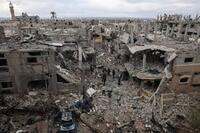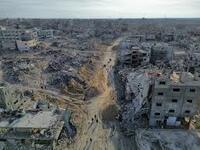Arnon Grunberg's Blog, page 8
July 31, 2025
Strategy
 Untenable
UntenableOn playing for time – The Economist:
‘Besides its propaganda purpose, the conflicting messaging reflects a lack of clarity. Mr Netanyahu has manoeuvred Israel into a corner where it has few options, much less a coherent strategy. Unofficial talks about a ceasefire have continued since indirect talks between Israel and Hamas broke down on July 24th. America is still urging Israel to make a deal that ends the war. Given intensifying international condemnation of Israel, Hamas may feel it can drive a harder bargain. But a deal that leaves Hamas with any degree of power in Gaza would be unacceptable to Israel.
Other plans being floated by Mr Netanyahu’s government are equally untenable. Opposition from the idf has blocked the government’s idea of forcing the entire population into a “humanitarian city” on a sliver of Gaza’s territory. Annexing parts of the strip or laying siege to the remaining areas inhabited by civilians would both worsen the already dire humanitarian situation and prompt louder global outrage without finishing off Hamas.
Airing such drastic ideas pleases Mr Netanyahu’s far-right coalition partners. Their power to rattle his government has been diminished now that the Knesset, Israel’s parliament, is in recess until mid-October. Mr Netanyahu could use this period for moves that would enrage them, such as agreeing to a ceasefire. Yet for now, he is playing for time. For starving Gazans, that means any relief may be temporary.’Read the article here.
Waiting for mid-October. For Gazans relief has been temporary since Gaza came into existence.
Israel is gripped by revenge and Messianism, and sometimes Messianism is just revenge.
Messianism as a poor excuse for an endless list of war crimes.
July 30, 2025
Impossible
 Mood
MoodOn a missed chance - Thore Schröder interviewing Ehud Olmert in Der Spiegel:
‘Ehud Olmert, 79, is a former prime minister of Israel. Originally from a Russian immigrant family, he was a key figure in Israel politics over the course of several decades. As a close confidant of Prime Minister Ariel Sharon, he took over control of the government following Sharon’s stroke in 2006 in addition to taking the reins of the centrist party Kadima. During his tenure, Olmert conducted negotiations on the establishment of a Palestinian state but also led wars in Lebanon in 2006 and in Gaza in 2008-2009. He resigned due to corruption allegations made against him. Today, he is a sharp critic of Prime Minister Benjamin Netanyahu.’
(…)
‘Olmert: In the first month after October 7, I said nothing publicly because I knew that my ideas would have sounded ridiculous to many: We should have negotiated a deal to bring back all of the hostages without a large war.
DER SPIEGEL: You mean a hostage deal to ward off the ground offensive that Israel launched at the end of October 2023?Olmert: The Qataris conveyed a message at the time whereby Hamas would be willing to immediately exchange all 251 hostages. My first thought was that the government wouldn’t even consider it. The mood in the country made it impossible to even consider such a thing.
DER SPIEGEL: Could such a deal have prevented a large war of retaliation in the long term?Olmert: It would have at least removed this huge burden from our shoulders – or, rather, from our hearts. These feelings of guilt and failure that have driven us since then.’
(…)
‘DER SPIEGEL: When you speak of war crimes, are you referring to the Gaza war in its entirety and not specific incidents?Olmert: There are a number of events that could be seen as war crimes. More than I can list. More than anything, though, it is the illegitimate war that is being waged out of the personal, political interests of the prime minister. As a consequence, Israeli soldiers are dying, additional hostages may be losing their lives, and many innocent Palestinians are being killed. That is a crime. It is unforgivable.’
(…)
‘DER SPIEGEL: In the West Bank, there are almost daily attacks by radical settlers on Palestinians, but there are no consequences. How can that be?Olmert: These are crimes against humanity being committed before the eyes of the Israeli police, army and government. They are doing nothing to stop the attackers. On the contrary, they are complicit. Without the support of public institutions, these "Hilltop Youth” would be powerless.’
(…)
‘DER SPIEGEL: Interest in a two-state solution has also dropped in Israel over the years. How could that be changed?Olmert: Through Israelis experiencing in their daily lives the damage that comes from a lack of a solution. If we are boycotted, if we are denied all kinds of advantages and freedoms that we currently take for granted.
DER SPIEGEL: Are you calling for a boycott of Israel?Olmert: No, I’m not calling for anything. I am merely afraid that it will happen. I am warning my people not to wait until it happens.’
(…)
‘The only person who can really change things is President Trump. If he tells Netanyahu that things have gone far enough in Gaza, the Israeli prime minister will back down.
DER SPIEGEL: Why hasn’t Trump yet done so?Olmert: Maybe he is waiting for Netanyahu to fall into his own trap – for him to go so far that he sacrifices the fundamental sympathy that Israel has thus far enjoyed in the U.S. That would make things easier for Trump. But I don’t really have a good explanation either.’
Read the article here.
At the end of October 2023, a deal with Hamas was possible, most of the hostages could have been returned immediately.
It might have looked like a Hamas victory.
But the situation today is nothing but a catastrophe created by Netanyahu with the support of too many Israelis.
Aid
 Airstrikes
AirstrikesOn hell - Jack Khoury in NYT:
‘The number of people killed in the Gaza Strip since the start of the war on October 7, 2023, has surpassed 60,000, the Hamas-run Health Ministry said on Tuesday.
While most of the casualties over the 21-month war were caused by Israeli airstrikes, Gazan officials are now highlighting deaths due to malnutrition and incidents near aid distribution centers.’
(…)
‘A physician at Gaza City's Al-Shifa Hospital told Haaretz that for most people, survival has become the sole focus. "There's no time to grieve in the hospitals," he said. "Doctors are working with improvised tools, mothers search empty markets for baby formula, and fathers risk their lives standing in endless lines for aid that might never come."’
(…)
‘The report also states that 2,163 families lost all of their loved ones – 7,563 people in total – while 5,943 families have only a single surviving member. Among the dead are 1,590 medical personnel, 122 civil defense workers, 228 journalists, 171 municipal employees and 777 security and aid protection staff.
The actual number of casualties could be significantly higher. Thousands of bodies are believed to still be buried under rubble and remain unrecorded. Around 7,000 people are listed as missing.
To draw international attention and increase pressure on Israel to end the war, local officials in Gaza have scaled back daily reports of airstrike casualties and now highlight only large-scale incidents.’
(…)
‘Alongside the casualties of war and starvation, many chronically ill Gazans are struggling to survive. According to the media office, 41 percent of kidney patients in Gaza have died since the war began.’
Read the article here.
The incompetence of the world, of the US, both Biden and Trump vis-a-vis Gaza has been well documented by now.
NYT reported that the war soon after October 7, 2023, had mainly one goal, to keep Netanyahu in power.
The genocide in Gaza is a catastrophe for the Gazans in the first place, for the Israelis, for the Jews outside Israel, and I dare to say for the rest of the world.
International law was far from perfect, I argued that waiting for the international organizations and international law, could be compared to involuntarily assisted suicide, for the Gazans that is, but there are other examples as well.
But the dismantling of this system is a return to the jungle.
And life in the jungle tends to be brute, nasty and short, in the end for everybody.
July 28, 2025
Flexible
 Troops
TroopsOn a total disaster – Patrick Kingsley in NYT:
‘When Israel broke its cease-fire with Hamas in March and returned to all-out war in Gaza, the country’s leaders said that the new military campaign and blockade on food would force Hamas to release more Israeli hostages in exchange for fewer Israeli concessions.
Four months later, that campaign is now increasingly perceived, in Israel and beyond, as a strategic, diplomatic and humanitarian failure, especially as starvation rises in Gaza.
In the last four months, Israeli troops have advanced farther into Gaza, mostly recapturing areas they relinquished earlier in the war. They recovered the bodies of eight slain hostages; killed more Hamas leaders, including the group’s top military commander, Muhammad Sinwar; and destroyed more of Hamas’s underground tunnel network.’
(…)
‘“I have to use these words: total failure,” said Michael Milstein, an Israeli analyst and former military intelligence officer. “We are no closer to achieving our main war goal — to erase the military and the governmental capacities of Hamas — and Hamas has not become more flexible. We find ourselves right now in a total disaster.”’
(…)
‘The outcome has resulted in a rare level of censure from Israel’s allies. Key partners like Britain and Germany called for the war to end. France said it would recognize a Palestinian state. The secretary-general of the United Nations, António Guterres, called the situation “a moral crisis that challenges the global conscience.”Before Israel started the blockade and broke the truce, Palestinians in Gaza were already suffering some of the worst conditions in a century of conflict between Israelis and Palestinians. A vast majority of the population was displaced and most of the buildings in the territory were damaged, according to the United Nations.’
(…)
‘A New York Times investigation has found that Mr. Netanyahu has dragged out the war partly for political reasons, in order to avoid upsetting key far-right partners who threatened their resignation if the war ended. Mr. Netanyahu denies the accusation, saying he has continued the war in the Israeli national interest.’
(…)
‘Israel needs to “strategically regroup, formulate a plan to defeat Hamas and provide a regionally and internationally acceptable solution for the future of the Gaza Strip,” said Mr. Conricus, an analyst for the Foundation for Defense of Democracies, a research group in Washington.’
Read the article here.
Strategically regroup? It might be too late for that.
October 7 was a disaster.
The Israeli response was a second disaster.
We cannot expect people to learn from history; history is not a lesson in morality or in waging war.
But the refusal to lean from 9/11 reveals a stubbornness that is beyond comprehension.
The genocide in Gaza will hunt Israel for decades.
But maybe then, there will be a future for the people in Gaza. And for the Israelis.
Damage
 Concessions
ConcessionsOn a trade war – The Economist:
‘Ever since President Donald Trump unveiled his Liberation Day tariffs in April, the world’s biggest trading relationship had been on the rocks. The European Union swung from trying to sweet-talk America into making a deal, to threatening retaliation. On July 27th dealmaking won out. At his golf course in Scotland the president and Ursula von der Leyen, the head of the European Commission, unveiled the outline of a preliminary trade agreement. The bloc has pulled off a tricky balancing act: making enough concessions to keep Mr Trump happy, while limiting the economic damage.’
(…)
‘The biggest concession is the bloc’s acceptance of a 15% tariff, which is more than nine times higher than the rate in place before Mr Trump returned to office. But the worst-case scenarios were so bad that Europe’s trade negotiators gave up on returning to anything close to those halcyon days. Over the past few months Mr Trump, convinced that the eu was ripping off his countrymen, had lobbed threats of duties ranging from 20% to 50%. And, as with a recent deal struck with Japan, European negotiators at least managed to lower the tariff rate on foreign-made cars, from 25% to 15%.’
(…)
‘What of the commitments to buy American? Europe’s promise to purchase $750bn worth of American energy products over the next three years is hardly a concession. The eu’s own calculations show that it is an achievable number, says Ms von der Leyen, even though it is unclear how to get there in practice. More importantly, the deal might even give Russia hawks on the continent additional leverage to push reluctant member states to finally ditch their habit of using Russian oil and gas. In June the eu still imported about 2bn cubic metres of lng from Russia, about a quarter of what it imports from America, according to Bruegel, a think-tank. If Mr Trump’s pressure helps to end fossil-fuel imports from Russia, that is good for Europe.’
(…)
‘Moreover, there is no knowing if further tariff threats could arise, as and when the president is next displeased. Europe has struck trade peace for now. But Mr Trump’s love of tariffs knows few bounds.’
Read the article here.
Once upon a time a man sued me.
He told my lawyer he was my friend.
My lawyer answered: ‘Friends don’t sue friends.’
Allies don’t threaten allies with trade wars.
But the worst has been averted. For the time being.
July 27, 2025
Counsel
 Conditions
ConditionsOn sich totsiegen – Adam Shatz in LRB:
“On 18 june, the sixth day of Israel’s attack on Iran, David Petraeus gave some unsolicited advice to Donald Trump in an interview with the New York Times. Trump, he said, should deliver an ultimatum to Ayatollah Ali Khamenei, ordering him to dismantle Iran’s uranium enrichment programme or face ‘the complete destruction of your country and your regime and your people’. If Khamenei were to refuse, he added, ‘that improves our legitimacy and then reluctantly we blow them to smithereens.’ That Petraeus was recommending Iran, a country of ninety million people, be reduced to Gaza-like conditions hardly occasioned comment: murderous threats from US officials against foreign leaders and their people no longer provoke shock, much less condemnation; they’re simply part of the ‘conversation’ about how the US should manage its empire.
On 22 June, the US air force dropped GBU-57 Massive Ordnance Penetrator bombs on uranium-enrichment sites at Fordow and Natanz, and fired Tomahawk missiles at the nuclear research centre near Isfahan. Initially, it seemed as if Trump was following Petraeus’s counsel, but then he rushed to proclaim victory, declaring that the strikes had demolished Iran’s nuclear capacity (according to a preliminary classified US report, the programme has been set back by only a few months); he then prevailed on Israel and Iran to accept a ceasefire. Israel’s strikes had caused extensive damage to residential neighbourhoods and property; as many as a thousand Iranians were killed. But Khamenei was not assassinated, despite Israel’s threats, and the US did not bomb Iran to smithereens, even if Trump compared his actions to Truman’s use of atomic weapons at Hiroshima (‘that stopped a lot of fighting, and this stopped a lot of fighting’) when he welcomed Netanyahu to the White House on 6 July. The starvation and killing in Gaza grew still worse, but so long as Israel and Iran were at war, Palestinian suffering was off the front page.”
(…)
“When Trump made plain that he wanted Israel to stop bombing, Netanyahu had little choice but to acquiesce. (Under a Democratic president, the US might not have joined the war, but the fighting could well have dragged on, amid impotent cries of ‘concern’ about casualties.)”
(…)
“The Iranian regime is not only militarily weak, it is also widely loathed by Iranians for its oppression and corruption. Among the regime’s officials and civil servants, the ardour of revolutionary Shiism long ago gave way to cynicism, with the Revolutionary Guard smuggling liquor and the Basij looking the other way when women took off their hijabs. The regime is also infested with spies: Israel’s campaign couldn’t have proceeded so smoothly, or with such velocity, without the help of a network of spooks and informants.”
(…)
“ During the war with Iraq, he insisted that the ‘path to Jerusalem runs through Karbala’, as if the battle with Saddam Hussein were the first stage of the liberation of Palestine. The Israelis responded by arguing that the path to Pax Israeliana ran through regime change in Tehran. Netanyahu has long been a vociferous advocate of military confrontation with the Islamic Republic, and in a video address released in the first days of Israel’s assault, he made an explicit appeal to the Iranian public: ‘As we achieve our objective, we are also clearing the path for you to achieve your freedom.’”
(…)
“For all Trump’s triumphalism, the ‘twelve-day war’, far from having ended Iran’s search for a nuclear weapon, may accelerate it.”
(…)
“Hard power can only get you so far if you have no soft power. But Netanyahu and the Israeli political establishment don’t seem concerned about these diplomatic costs – or about the collapse of the country’s moral reputation as a result of the wanton destruction of Gaza. They simply shrug off the criticisms; after all, they say, the world is against us. In fact, Israel still has the governments of the US and most of the West behind it.”
(…)
“After the 1967 war, Isaac Deutscher recalled a German phrase, ‘Man kann sich totsiegen’ – ‘you can triumph yourself to death.’ The same is true of Israel’s wars today, and for largely the same reasons. ‘Unless Israel decides to forcibly expel hundreds of thousands or even millions of Palestinians into Egypt or Jordan,’ Yezid Sayigh, a Palestinian analyst based in Beirut, told me, ‘it can’t overcome the principal obstacle to total colonisation, which is the fact that the Palestinians are still there, in Gaza and the West Bank. Which is to say: Israel has set itself on a trajectory for which it has no solutions other than a final solution, and final solutions aren’t easy to implement.”
(…)
“The New York Democratic machine and the New York Times, which has been running hit pieces on Mamdani unconvincingly disguised as reportage, dislike him because of his democratic socialist convictions, but the chief focus of their attacks has been his opposition to Israel’s occupation and his criticisms of the war on Gaza. Since the last weeks of the campaign, Mamdani has found himself denounced as an antisemite, a jihadist, a supporter of the 9/11 attacks, because he spoke of ‘apartheid’ and ‘genocide’ in Palestine, and because he refused to say that he supported Israel’s ‘right to exist as a Jewish state’. (He said that he supports its right to exist as ‘a state with equal rights’ – a position that, from a conservative Zionist perspective, is tantamount to calling for Jews to be thrown into the sea.) ‘Zohran “little Muhammad” Mamdani is an antisemitic, socialist, communist who will destroy the great City of New York,’ Andy Ogles, a Republican congressman from Tennessee, wrote on X. ‘He needs to be DEPORTED.’”
(…)
“Achcar says that the 7 October attack was ‘the most catastrophic miscalculation in the history of anticolonial struggle’. A strong case can be made that it has set back the Palestinian struggle for the foreseeable future.”
(…)
“Malley and Agha argue that, for negotiations between Israeli Jews and Palestinian Arabs to work, they will have to include ‘powerful groups who felt that what was discussed was at odds with their core beliefs’ – the rejectionists of both camps, from Palestinian Islamists to Jewish settlers and the ultra-Orthodox. They believe that something could come out of a more open-ended conversation, with no clear horizon, or ‘solution’. These groups, they write, might even find a way of co-existing in the same land without renouncing their larger aspirations, as Catholics and Protestants in Northern Ireland have done since the Good Friday Agreement.”
(…)
“Even so, it’s extremely difficult to imagine the dismantling of Israel’s apartheid system, or to imagine a serious challenge to its domination emerging anytime soon. In a world of rising authoritarianism and ethnonationalism, where the rule of law has all but crumbled, the brutal, pitiless state run by Netanyahu looks more like a pioneer than an outlier.”
Read the article here.
Isaac Deutscher was not always right, but often he was, and yes man kann sich totsiegen.
One day the Good Friday Agreement, in this or that form, will come to Israel and Palestine, that’s the long-lasting hope of all those who don’t believe that God is in favor of the forever war.
October 7 was a miscalculation, but I’m not sure if it will have “set back the Palestinian struggle for the foreseeable future.”
Netanyahu is bringing the Palestinian closer, precisely because he is doing his utmost to prevent such a state forever.
But Shatz is right, Netanyahu is not an outlier, he is a pioneer. The brutal, pitiless nation state, shaped in the image of Carl Schmitt, might be on a victory path.
The small comfort is that no victory path lasts forever.
July 26, 2025
Court
 Extensive
ExtensiveOn genocide - Dahlia Scheindlin in Haaretz:
‘Genocide: The word is everywhere. It hounds us on our screens, and it haunts us in our sleep. It inflames emotions like few other terms do.
"Genocide" simultaneously carries legal, moral, historical, comparative and strategic meaning. Does it fit the legal definition, codified by the United Nations in 1948 and incorporated into the 1998 Rome Statute, the legal basis for the International Criminal Court? Should one use the term out of moral integrity? Is it recognizably similar to genocides of the past or present?’
(…)
‘It's hard to tell, because the debate has become muddled and very extensive. In his long and pained essays, Omer Bartov, one of the world's foremost genocide scholars, first argued that the war in response to October 7 did not yield evidence of genocide in November 2023, but it does now. His claims launched waves of responses, from academic blogs with a judicious inquiry about what the debate has come to represent, to responses from New York Times' columnists ("no, it's not"). Haaretz has also hosted a vigorous debate over the issue – with Bartov, and additional voices, also the top thinkers and scholars, arguing and responding to one another.’
(…)
‘Interestingly, both Bret Stephens in the New York Times and the authors of the Bar-Ilan report expressed their concern about cheapening or trivializing the term.
"Rather than deterring aggressors and preventing atrocities, the term 'genocide' will lose its profound legal and emotional weight, becoming a political tool. In future crises, including those where deliberate, systematic efforts to annihilate a nation or group occur, the trivialization of genocide will serve as an excuse for future atrocities ... international laws meant to protect vulnerable populations could be severely undermined, with grave consequences for all of humanity," the Bar-Ilan authors wrote.’
(…)
‘It's impossible to shake the impression that ultimately the aim of people devoting such great efforts to dispelling the genocide charge are ultimately seeking to justify a war which frankly cannot be justified at this point.’
(…)
‘Here are two examples of extremely valuable, considered examinations of genocide. The historian Lee Mordechai has produced a terrifyingly a meticulous report about the catastrophic destruction in Gaza, with rolling updates, exhaustively sourced and easy to read – driven by his own conscience with no organizational or institutional agenda.’
(…)
‘If the word genocide is too troubling for you personally, move on – focus instead on the relentless investigations by Haaretz's Nir Hasson, which answer questions like why so many Gazans are getting shot and killed trying to reach food centers, and how many are actually dying? Look at the pictures of starving children and stop worrying about what to call it: Focus instead on ending the war.’
(…)
‘If the word genocide haunts you, what should be haunting you is Gaza.’
Read the article here.
A war that frankly cannot be justified at this point.
The genocide-debate might easily become a distraction.
I repeat: Trump can order Netanyahu to stop the war. He is the only one who can do that.
But apparently, he cannot be bothered.
Maybe he is waiting for, yes for what? For the ghost of Epstein, for a sign?
July 25, 2025
Streak
 Deadpan
DeadpanOn deadpan comic stares (thanks to my friend P) – Sian Cain and agencies in The Guardian:
‘South Park co-creator Trey Parker had the briefest of responses on Thursday to anger from the White House over the latest season premiere, which showed a naked Donald Trump in bed with Satan.
“We’re terribly sorry,” Parker said, followed by a long, deadpan-comic stare.’
(…)
‘Earlier in the day, the White House issued a statement on the 27th season premiere episode, which aired Wednesday night. Unlike other characters in the animated show, Trump is depicted as an actual photo of the US president on an animated body. There is also an extended scene featuring a hyper-realistic, deepfake video of Trump, completely naked, walking in a desert; and repeated suggestions that Trump’s genitalia are small.
“This show hasn’t been relevant for over 20 years and is hanging on by a thread with uninspired ideas in a desperate attempt for attention,” White House spokesperson Taylor Rogers said in the statement. “President Trump has delivered on more promises in just six months than any other president in our country’s history – and no fourth-rate show can derail President Trump’s hot streak.”’
(…)
‘The efficiency of South Park production – each episode is made in just a few days and can be finished within hours of going to air – allow it to stay incredibly current for an animated series.
“I don’t know what next week’s episode is going to be,” Parker said at Comic-Con. “Even just three days ago, we were like, ‘I don’t know if people are going to like this.’”’
Read the article here.
Probably we should have moved beyond small or not so small genitalia but given the reaction of the White House spokesperson I guess, it’s mostly about genitalia. The rest is about power. To paraphrase Wilde.
July 24, 2025
Mud
 Reasons
ReasonsOn war crimes and diplomacy – Amir Tibon in Haaretz:
‘The Italian island of Sardinia, with its serene coastline and laid-back atmosphere, doesn't have a particularly notable history of hosting important diplomatic events. In fact, the one time it was supposed to host the G8 international summit to bring together the leaders of the world's most prosperous countries, the gathering was eventually moved to the Italian mainland for economic reasons.
But on Thursday, Sardinia will host a crucial meeting between senior representatives of the United States, Israel and Qatar, in an attempt to pull the Gaza cease-fire negotiations out of the mud and move them toward an agreement.’
(…)
‘The bottom line hasn't changed: Hamas wants a comprehensive agreement to end the war in return for the release of all the hostages; Netanyahu wants a partial, temporary cease-fire that will bring back only half the hostages, but allows him to renew the war later on. The Trump administration, just like the Biden administration before it, has failed to square this circle.’
(…)
‘Witkoff's arrival in Europe signals that some of the problems in the talks may indeed have been solved, but his meeting with Dermer and the Qatari prime minister is also a sign that some obstacles still remain. If an agreement was ready for signing, the special presidential envoy probably would have flown directly into Doha; instead, he is convening the top negotiators to try and push both Israel and Hamas (through Qatari influence) to compromise further.
All this is happening at a moment when international criticism of Israel is reaching new heights, as shocking images of hunger, death and destruction emerge from Gaza and rattle even steadfast supporters of Israel. Right-leaning media outlets in the U.S., the U.K. and Europe are accusing Israel of intentionally starving the Strip – in other words, it is no longer just MSNBC and The Guardian reporting on the humanitarian catastrophe in Gaza, but also Fox News and the Daily Telegraph.’
(…)
‘But just like in previous rounds of talks, it will only work if he himself sets the terms of the negotiations, and does not allow Dermer and Netanyahu to decide what the guidelines are. If he does that, important diplomatic news could, for the first time, come out of Sardinia.’
Read the article here.
Yes, even rightwing media cannot ignore the war crimes Israel is committing in Gaza. According to most experts, genocide is one of the war crimes.
Important diplomatic news might come out of Sardinia, but more important, what will come after Bibi? When will a truth commission see the light? For all people involved, the sooner the better.
July 23, 2025
Plenty
 Attachments
AttachmentsOn connections – Michael Hauskeller in TLS:
‘Most of us form such connections without thinking much about it, but attaching ourselves to others comes at a cost. This not only diminishes our autonomy, but also makes us vulnerable. Lord Tennyson famously claimed that it’s better to have loved and lost than never to have loved at all. But is it really? It depends on what we want from life. If we value our autonomy and want to suffer as little pain as possible, we should perhaps follow the advice of the philosophers – of whom there are plenty – who have claimed that the best way to secure our own personal happiness is to stay emotionally detached from things, including other people.’
(…)
‘In his new book, One Life to Lead: The mysteries of time and the goods of attachment, Samuel Scheffler answers with a resounding no. We may be able to lead some kind of life without attaching ourselves to other people, but we cannot lead a good life, because “some of the most important constituents of a good life are our relationships with and attachments to other people, which enrich our lives beyond measure”. The central message is that human life is essentially shared and that autonomy is overrated. We make sense of the world and ourselves through interaction and communication: not just by doing things, but by doing them with others and in response to others. Many of our projects involve other people, and we couldn’t do what we do if those people didn’t matter to us; and they in turn couldn’t matter to us if what matters to them didn’t matter to us. Our attachments, writes Scheffler,point us outward rather than inward, by requiring us to account for ourselves to others and to submit to the requirements of activities we find compelling. We achieve good lives not simply by ruling ourselves but by focusing our attention on the world around us and by developing a practical orientation that enables us to engage in ways we find rewarding with items drawn from the rich array of valuable activities and social forms that the world has to offer.’
(…)
‘Unfortunately, however, we have only one life to lead, and only so much time and emotional energy. Of all the many possible attachments we could form, we can accommodate only a small number; we must choose which people and activities we should build our lives around.
Some philosophers have claimed that making such a choice violates what both morality and reason demand of us, namely that we stay neutral and impartial: after all, nobody is more important than anyone else, so we should not treat some people more favourably than others. It shouldn’t matter whether a person is your friend or your brother, whether they live nearby or far away, now or in the future. They all deserve the same. Scheffler doesn’t dispute that, but he insists that there is nothing irrational or immoral about valuing some people and activities more than others, provided we don’t overdo it.’
(…)
‘Other apparent mysteries are more obviously pertinent to our experience of leading an attached life, such as the question of why we consider it proper that people grieve when someone has died, but also proper that they stop grieving eventually, even though the person is just as dead as before.’
(…)
‘But how can we tell what is genuinely valuable and what is not if what we value is at least partially determined by the people and groups we are attached to?’
Read the article here.
When becomes normal grief an illness?
And yes, how do we know what kind of things are genuinely valuable?Should a citizen be willing to die for his country or is it perfectly understandable that law-abiding citizens say: ‘I pay taxes, that should be enough.’
Can things be genuinely valuable if you are not willing to die for these things?
Arnon Grunberg's Blog
- Arnon Grunberg's profile
- 415 followers



